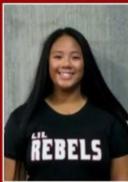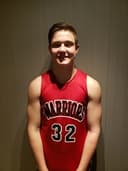
 2019 Highlights
2019 Highlights NV State Semifina...
NV State Semifina... NV State Quarterf...
NV State Quarterf... Southern NV Regio...
Southern NV Regio... Southern NV Regio...
Southern NV Regio... Southern NV Regio...
Southern NV Regio...“You don’t get what you wish for, you get what you work for.” These are the first words that seep into my mind when I first open my eyes each morning. The poster with a blue background and bold black writing in the cheap plastic frame, hangs at the opposite side of my room. As these words unfold themselves in the fore-front of my mind, I contemplate the two choices I have today: will I devote myself to the tasks required to succeed or will I surrender to my own apathy? Every day battling my own Attention Deficit Disorder; I think to myself “will I be able to focus my mind today?” My mom first noticed this small developmental anomaly during the third grade. Teacher after teacher assured her that it’s normal, boys develop differently, it’s puberty or hormones. By my freshman year of high school, my grades were suffering and my attitude was deplorable. My parents and I had shouting matches more than actual conversations. Logically, I knew my parents pleas to do my homework and study were in my own best interest, but I could not physically force myself to do the assignments. Wrestling was my escape. When I was on the mat just me and my opponent, I was fixated on my next move, listening for directions from my coaches. This is when my mind is most calm. Surrounded by the cheers of parents, shouts from coaches, the whistle of the referee on the adjacent mat, the bright lights of the school gymnasium shining down, I am in control. The match is mine to win or lose; and the reward or punishment for my efforts, almost immediate.
While I improved athletically, I continued to struggle with my schoolwork. Finally, in the middle of sophomore year I was evaluated by a psychiatrist, and received a diagnosis of ADD or Attention Deficit Disorder. Treatment consisted of a regimen of neurofeedback and medication. The process uses electrodes attached to my head through what can only be described as a shower cap to read my brain waves. Using the focus area of my brain I had to lift a ship off the ground on the screen it was connected to. The neurofeedback trained me to strengthen the focus center of my brain, like lifting weights strengthens my muscles. Each visit was like a match, with the ship on the screen as my opponent, and I was in control. Then one day insurance no longer covered my neurofeedback treatments, so I needed to find something new. I turned to legos, pieces used to create my own world one I could focus on and keep control over. I started to enjoy building again and began to start new projects: rebuilding computers, making small robots and even coding my own video game.
Building has always been a passion for me and from a young age, and my dad has included me in all his own building endeavours from RC cars to home remodels. He always had a project in mind for us to work on, whether it was remodeling a car or building a simple model he always like to include me in his creative process. I hope that I can continue these creative endeavours in college under an engineering major as well as continue to build my skills in wrestling to achieve an all-american status.







